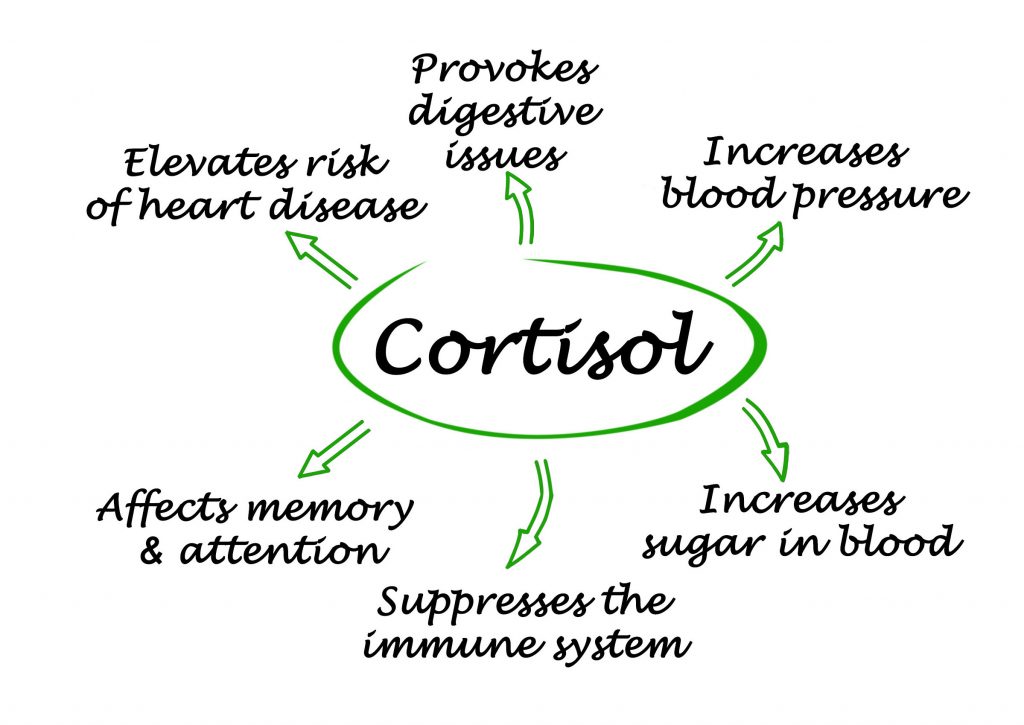Stress, that unwelcome guest we all know too well, can be more than just a mental burden. It has a sneaky way of influencing our bodies, including our weight. Have you ever wondered why those extra pounds seem to tag along during stressful times? We’re here to unravel the mysteries and provide you with a roadmap to shed that stress-induced weight.
Stress isn’t just about mental strain; it sets off a chain reaction in our bodies. It can tangle up hormones, influence our cravings, and even alter the way we store fat. The result? Weight gain that seems to appear out of thin air.
This article is your guide to understanding how stress can affect your weight and, more importantly, how to tackle it head-on. So, let’s untangle the connections between stress, weight gain, and weight loss. Along the way, we’ll introduce you to “Your Personal Blueprint” – a tailor-made plan that brings together science, mindfulness, and support to help you reclaim control over your body and health. Because remember, stress might be a part of life, but you have the power to define how it affects you.
The Science Behind Stress-Induced Weight Gain
The Hormonal Dance- How Stress Influences Your Weight
Stress is no mere psychological disturbance; it’s a physical game-changer too. The intricate hormonal dance within your body holds the key to understanding how stress can lead to weight gain. As we explored in our previous article “The Role of Cortisol in Weight Gain – How Stress Shapes Your Body,” cortisol—the primary stress hormone—plays a central role. It’s like a conductor directing a complex orchestra.

When stress strikes, cortisol is released into your bloodstream. This surge is a natural survival mechanism, a throwback to when stress meant facing predators or dangers. However, in the modern world, chronic stress often triggers prolonged cortisol elevation. This can lead to an increase in appetite, particularly for comfort foods rich in sugar and fat, a tendency we’ve evolved to address stress swiftly.
Now, let’s bring in insulin, a hormone responsible for regulating your blood sugar levels. Chronic stress can lead to insulin resistance, meaning your cells don’t respond as effectively to insulin’s signals. This leads to higher blood sugar levels and prompts your body to store more fat, particularly around your abdomen—a classic sign of stress-induced weight gain.
Also Check – How Does Stress Influence Weight Gain and Loss?
Cortisol and Insulin- Dynamic Duos Impacting Stress-Weight Dynamics
In the previous section, we discussed how cortisol and insulin are pivotal in the stress-weight relationship. This dynamic duo doesn’t merely influence your body’s response to stress; it actively impacts how your body manages weight in times of stress.
Cortisol’s role as the stress hormone has been well-established. But what’s often overlooked is its intricate interaction with insulin. Chronic stress can disrupt your body’s insulin sensitivity, making it harder for cells to effectively take in glucose. This situation triggers a cascade of events, leading to higher blood sugar levels and increased fat storage, especially around your midsection.
Consider these hormones as partners in an intricate dance- cortisol cues your body’s stress response, while insulin regulates how your body processes energy. When stress becomes chronic, this dance can spiral into disarray, fostering an environment conducive to weight gain.
How Emotions Lead to Weight Gain

Stress and emotions are interconnected in intricate ways. You might have experienced stress eating—turning to food for comfort during tough times. When stress hits, your brain seeks solace, and for many, that solace is found in the taste of certain foods. This emotional connection between stress and eating can lead to overconsumption, as the desire for comfort often overshadows physical hunger cues.
The science behind this emotional eating lies in the brain’s reward system. Sugary, fatty foods trigger the release of feel-good chemicals like dopamine, providing temporary relief from stress. Unfortunately, this relief is fleeting, leading to a cycle of overeating in search of more comfort.
Also Check – How often Should you Weigh Yourself? – Find Your Balance and Understand Your Body
14 Effective Strategies to Shed Stress-Induced Weight Gain
Mindful Munching- 5 Techniques to Avoid Stress-Driven Overeating
- Engage Your Senses- Before diving into your meal, take a moment to appreciate the colours, smells, and textures of your food. Engaging your senses can help you fully experience each bite, making the meal more satisfying and reducing the tendency to overeat.
- Portion Control- Utilise smaller plates and bowls to encourage portion control. This visual trick can help prevent the temptation to pile up your plate and guide you towards more mindful portions.
- Slow Down- Eating slowly and chewing each bite thoroughly gives your brain the time it needs to register feelings of fullness. Rapid eating can lead to overeating, as the brain doesn’t have a chance to catch up with the stomach.
- Distraction-Free Dining- Turn off screens and create a calm eating environment. Engaging in mindful eating without distractions helps you fully focus on your food, leading to better recognition of when you’re comfortably full.
- Hunger Check- Tune into your hunger cues before eating. Rate your hunger on a scale of 1 to 10, with 1 being extremely hungry and 10 being overly full. Aim to eat when you’re around a 3 or 4 on the hunger scale to prevent excessive consumption.
Sweat It Out- Top 3 Stress-Busting Workouts for Effective Weight Management
- Cardiovascular Exercise- Engage in activities like running, cycling, or brisk walking to trigger the release of endorphins, which are natural mood elevators. Cardiovascular exercise not only burns calories but also promotes a sense of well-being.
- Yoga- Combine movement with mindfulness through yoga. This practice reduces tension in both body and mind, fostering relaxation and improving body awareness. The combination of gentle stretches and deep breathing can be especially effective in reducing stress.
- High-Intensity Interval Training (HIIT)- HIIT involves alternating between intense bursts of exercise and short rest periods. This approach elevates your heart rate, releases stress, and boosts metabolism. HIIT workouts can be efficient and effective, especially for those short on time.
Also Check – 11 Calming Breathing Techniques for Relaxation and Stress Relief
Beauty Sleep – Enhance Your Zzz’s for Better Stress and Weight Control
- Consistent Schedule- Maintain a regular sleep schedule, going to bed and waking up at the same times each day. This practice helps regulate your body’s internal clock, improving sleep quality.
- Dark and Cool- Create a sleep-conducive environment by keeping your room dark, quiet, and comfortably cool. These conditions promote better sleep quality and duration.
- Tech-Free Zone- Power down electronic devices at least an hour before bedtime. The blue light emitted by screens can disrupt your body’s production of melatonin, a hormone that regulates sleep.
Also Check – Sleep’s Role in Weight Loss- How Insufficient Rest Impacts Progress
Inner Peace, Outer Results- Tried-and-True Stress Management Techniques
- Meditation- Dedicate a few minutes each day to meditation. Sit in a quiet space, close your eyes, and focus on your breath. Meditation calms the mind, reduces stress hormones, and fosters mental clarity.
- Deep Breathing- Practice deep breathing exercises to trigger the relaxation response. Inhale deeply through your nose for a count of four, hold for four counts, and exhale slowly through your mouth for a count of six. This technique calms your nervous system and reduces stress.
- Progressive Muscle Relaxation- Begin by tensing and releasing different muscle groups. Start with your toes and work your way up to your head. This process helps release physical tension and promotes relaxation.
Also Check – 9 Effective Relaxation Techniques for Better Sleep- A Holistic Guide
Eat for Equilibrium- 10 Nutrient-Packed Foods for Stress Relief
Incorporate Ayurvedic wisdom into your diet with stress-fighting foods-
- Turmeric- A potent anti-inflammatory spice that supports overall well-being and counters stress-related inflammation.
- Ashwagandha- An Ayurvedic adaptogen known for its stress-reducing properties. It can be consumed as a supplement or added to foods.
- Tulsi (Holy Basil)- Revered for its calming effects, Tulsi tea or leaves can help reduce stress and promote relaxation.
- Brahmi- This herb is believed to enhance cognitive function, reducing the impact of stress on the mind.
- Ghee- Clarified butter contains butyric acid, which supports gut health and contributes to overall resilience against stress.
- Amla- Rich in vitamin C and antioxidants, Amla helps combat oxidative stress caused by chronic tension.
- Mung Beans- A staple in Ayurvedic cuisine, mung beans are easy to digest and provide nourishment without taxing the digestive system.
- Coconut- Whether in the form of coconut oil, water, or flesh, coconut provides healthy fats that support brain health and resilience to stress.
- Saffron- A precious spice with mood-lifting properties, saffron can be added to foods or consumed as a tea.
- Triphala- A blend of three fruits, Triphala aids digestion and promotes balance within the body, which is crucial for stress management.
By embracing these strategies and incorporating Ayurvedic principles, you’ll not only manage stress-induced weight gain but also nurture your overall well-being. Remember, sustainable results come from consistent practice and a comprehensive approach to health.
Also Check – Mindful Minutes- Quick Meditation Tricks for Busy Women
Social Support- Your Secret Weapon
The Power of Social Networks in Stress and Weight Management
When stress rears its head, having a strong social network to lean on can provide an essential safety net. Talking about your feelings with trusted friends or family members can alleviate emotional burdens, reducing the urge to turn to food for comfort. This communication also serves as a reminder that you’re not alone in facing these challenges.
Together Towards Wellness- Forming Connections for Stress-Weight Success
Consider joining a local or online support group with individuals who share similar goals. Sharing your journey with others fosters accountability and encouragement. You can exchange strategies, celebrate victories, and offer a listening ear when someone needs it most.
Unique Tips for Building Social Support
- Accountability Partners- Partner up with a friend or family member who also aims to manage stress and weight. Check in regularly to share progress and challenges.
- Cooking Club- Organise a healthy cooking club where members take turns preparing nutritious meals. It’s a fun way to bond while learning new recipes.
- Group Fitness- Join a fitness class or club that interests you. Working out together not only supports weight management but also provides an opportunity to forge new connections.
- Online Communities- Participate in online forums or social media groups dedicated to stress reduction and weight management. Virtual support is just as impactful as in-person connections.
- Walking Buddies- Engage in regular walks with friends or family. Walking not only promotes physical activity but also provides a chance to share thoughts and experiences.
- Mindful Meal Sharing- Enjoy meals mindfully with loved ones. Engaging in conversation and savouring the flavours can prevent overeating and deepen your connections.
- Supportive Challenges- Organise friendly challenges, such as a step-count competition or a healthy recipe exchange. These activities promote camaraderie while focusing on well-being.
Remember, you don’t have to face stress-related weight challenges alone. Building a strong social support network not only helps manage stress but also provides encouragement, motivation, and a shared sense of purpose.
Craft Your Personal Blueprint to Shed Stress-Induced Weight Gain
Tailoring Your Strategy- Mix and Match to Create Your Ideal Stress-Weight Plan
No two individuals are alike, and neither are their stressors or responses. Therefore, it’s crucial to customise your stress-weight management plan.
Here’s how-
- Assess Your Triggers- Reflect on the situations that trigger stress-related eating. Are there specific times, places, or emotions that lead to overeating? Identifying these triggers empowers you to develop targeted strategies.
- Choose Your Techniques- Review the strategies you’ve learned, from mindful eating to exercise routines. Select the techniques that resonate with you and align with your lifestyle.
- Set Realistic Goals- Determine your weight loss goals and stress reduction targets. Make sure they’re attainable and sustainable to avoid frustration.
- Create a Schedule- Integrate stress management activities and healthy habits into your daily routine. Consistency is key to long-term success.
- Track Your Progress- Keep a journal to record your successes, setbacks, and emotional patterns. This helps you adjust your plan based on real-time feedback.
- Stay Flexible- Be prepared for adjustments along the way. Life is dynamic, and your stressors may change. Adapt your strategies as needed.
- Mindful Eating Practice- Apply mindful eating techniques during meals. Focus on your food, eat slowly, and savour each bite.
- Exercise Routine- Choose exercises you enjoy, whether it’s jogging, dancing, or yoga. Aim for a mix of cardiovascular and strength training.
- Sleep Hygiene- Create a sleep-conducive environment, maintain a regular sleep schedule, and prioritise restful sleep.
- Social Support- Engage with your chosen support network. Share your goals, challenges, and victories with them.
Consistency and Patience- Keys to Unlocking Long-Term Stress-Weight Victory
Remember that sustainable change takes time. Here are some insights to keep in mind-
- Embrace Consistency- Consistently practise your chosen strategies. Small, steady efforts yield more significant results over time.
- Be Patient- Progress might not always be linear. There will be ups and downs, but consistent effort will lead you in the right direction.
- Celebrate Small Wins- Acknowledge and celebrate each achievement, no matter how small. These milestones fuel motivation.
- Learn from Setbacks– If you encounter setbacks, view them as learning opportunities. Identify triggers and adjust your strategies accordingly.
- Mind-Body Connection- Cultivate self-awareness. Listen to your body’s cues for hunger, fullness, and stress.
- Adapt and Evolve- As you change and grow, your strategies may evolve. Continue tailoring your approach to align with your evolving needs.
Your personal blueprint is a dynamic, evolving guide that aligns your stress-management and weight-loss goals. It’s a reflection of your commitment to a healthier, more resilient version of yourself. Keep these insights and strategies close as you navigate the complexities of stress, weight, and well-being.
Conclusion
In the intricate dance of stress and weight, understanding the science, debunking myths, and adopting tailored strategies are your keys to success. Remember, stress’s impact on weight is nuanced, and there’s no one-size-fits-all solution. By embracing mindfulness in eating, finding joy in movement, nurturing restful sleep, seeking support, and personalising your approach, you pave the way for a healthier you.
Life’s challenges are woven with stress, but as you’ve learned, it doesn’t have to control your journey. With the right tools, mindset, and determination, you’re equipped to manage stress’s effects on weight and reclaim your well-being. So, as you navigate this path, remember- when stress knocks, you hold the power to choose your response and shape a healthier, happier life.

Leave a Reply